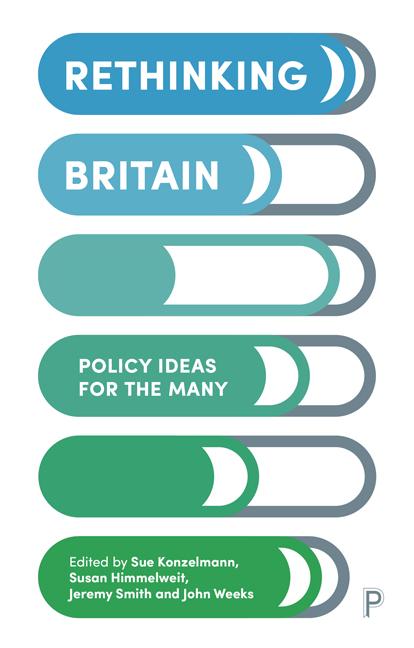Book contents
- Frontmatter
- Contents
- List of Tables and Figures
- The Contributors
- Foreword
- Introduction
- Interlude: ‘Mirror, Mirror, On the Wall – Who has the Highest Debt of All?’
- Part One Building a Full-Employment Economy: Introduction
- Part Two Public Investment – Prioritising Society Rather than Profit: Introduction
- Part Three Making Finance Work for Society: Introduction
- Part Four Genuine Social Security: Introduction
- Part Five How to provide for Social Needs: Introduction
- Conclusion
- Jargon Busters
- References and Further Reading
- Index
3 - Why Assessing the Equality Impact of Economic Policies Matters
Published online by Cambridge University Press: 11 March 2021
- Frontmatter
- Contents
- List of Tables and Figures
- The Contributors
- Foreword
- Introduction
- Interlude: ‘Mirror, Mirror, On the Wall – Who has the Highest Debt of All?’
- Part One Building a Full-Employment Economy: Introduction
- Part Two Public Investment – Prioritising Society Rather than Profit: Introduction
- Part Three Making Finance Work for Society: Introduction
- Part Four Genuine Social Security: Introduction
- Part Five How to provide for Social Needs: Introduction
- Conclusion
- Jargon Busters
- References and Further Reading
- Index
Summary
What's the issue?
The public sector equality duty (PSED), contained in the Equality Act 2010, requires public bodies to have ‘due regard to the need to eliminate discrimination, advance equality of opportunity and foster good relations between different people’ when carrying out their activities. This applies to all ‘protected characteristics’, such as race, sex, disability, age, sexual orientation, and to policy-making at all levels – central, national and local.
The PSED has had a positive impact on equality practice within public authorities and, to a limited extent, in policy-making. However, its aim was to bring about a transformative approach to equality by going beyond simply outlawing discrimination to tackle inequality at a structural level. The duty has failed to fulfil this aim.
In particular, there has been a failure to consider the gender equality impact of a number of economic policies. This is true not only of the government, but also of the manifesto commitments of opposition parties (with the exception of the Women's Equality Party).
Why does knowing about the gender impact of policies make for better policy-making?
Analysis
The Equality Act 2010, which included the PSED, was one of the last Acts passed under the Labour government. Practice in implementing it has therefore been set by the coalition and subsequent Conservative governments.
The coalition government made a number of changes to the duty that reduced both its scope and its effectiveness. These included the removal of the socioeconomic duty, which would have required policy-makers to consider the impact of their policies on income-based inequality as well as other forms of inequality.
The government has also weakened the PSED in its implementation. It has significantly cut the budget and remit of the Equality and Human Rights Commission (EHRC), the body responsible for monitoring and enforcement of the PSED. Ministers have questioned the need for public bodies to carry out equality impact assessments (EIAs) and government departments have failed to publish them, making it impossible to judge whether ‘due regard’ has been paid to equality considerations.
- Type
- Chapter
- Information
- Rethinking BritainPolicy Ideas for the Many, pp. 24 - 28Publisher: Bristol University PressPrint publication year: 2019



